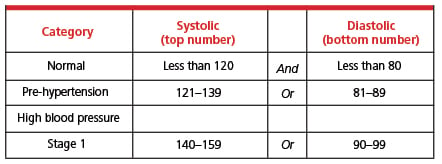The National Heart Lung and Blood Institute says "Blood pressure" is the force of blood pushing against the walls of the arteries as the heart pumps blood. If this pressure rises and stays high over time, it can damage your body in many ways.
About 1 in every 3 adults in the United States has High Blood Pressure (HBP), a condition that can lead to coronary heart disease (also called coronary artery disease), heart failure, stroke, kidney failure, and other serious health problems.
When you go see your doctor getting your blood pressure checked is part of your visit. You will hear two numbers, 120/80 mmHg, for example. (The mmHg is millimeters of mercury—the units used to measure blood pressure.)
The top number is called the systolic (sis-TOL-ik) pressure. This measures the force of blood against the walls of the arteries when the heart is pumping. The lower number is called the diastolic (di-a-STOL-ik) pressure. This measures the force of the blood when the heart is resting. Both numbers are important and need to be controlled.
High blood pressure occurs when your systolic pressure is 140 or higher and when the diastolic pressure is 90 or higher.
The table below shows what the normal blood pressure number are for adults. It also shows what numbers put you at greater risk for health problems:

Your blood pressure doesn’t stay at the same levels all the time. As you sleep it lowers and then rises again when you wake up. Other factors that affect your blood pressure are excitement, nervousness, or strenuous activity. However, if your numbers stay above normal more often than not, you may be at risk for health problems.
According to the Center for Disease Control and Prevention, all levels above 120/80 mmHg raise your risk, and the risk grows as blood pressure numbers rise.
"Pre-hypertension" means you're likely to end up with HBP, unless you take steps to prevent it.
How can I prevent High Blood Pressure?
Getting regular exercise is an excellent way to keep your blood pressure levels balanced. Physical activity lowers your risk by about 20%-50%. Even light daily activity, like walking can help.
Another factor is stress, which can raise your blood pressure and over time can contribute to the risks of high blood pressure. It’s important to find ways to fit rest and relaxation into your life, to help you reduce stress.
Being overweight can make you two to six times more likely to develop high blood pressure. Even small amounts of weight loss can make a big difference in helping to prevent and treat high blood pressure. Maintaining a healthy diet and reducing your salt intake can have a very positive effect on your health and blood pressure.
There are no real symptoms when you have elevated blood pressure. So it’s important to visit your doctor regularly. If you do have high blood pressure or you are at risk for high blood pressure, it’s important to listen to your doctor and work to keep your levels under control. Uncontrolled high blood pressure increases the risk for heart attacks and stroke. When high blood pressure is controlled, the threat of these complications is greatly reduced.
For more information on High Blood Pressure risks and factors visit the Center for Disease Control and Prevention or the National Heart Blood and Lung Institute.



Let Us Know What You Thought about this Post.
Put your Comment Below.